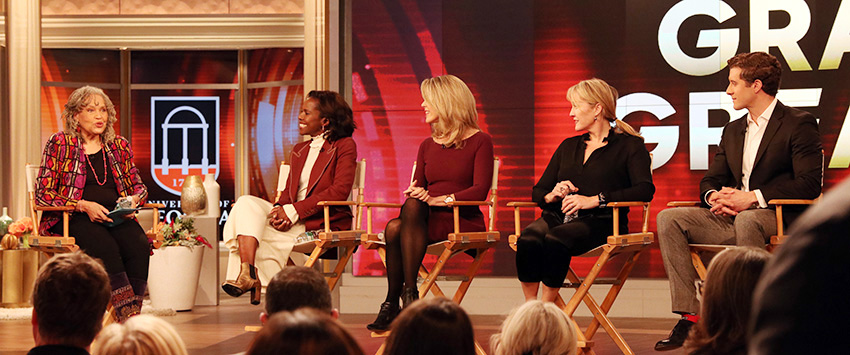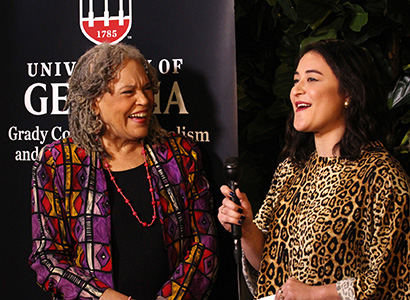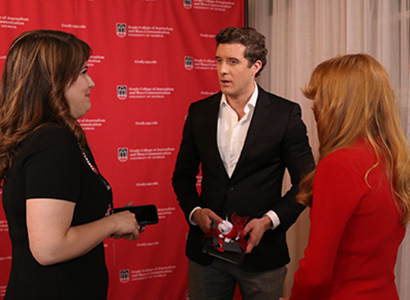Nine ways to be a better journalist, shared by Grady Greats panelists

Nine ways to be a better journalist, shared by Grady Greats panelists
A screening of the Grady Greats broadcast will be held Ciné Athens at 5:30 p.m. on Thursday, April 25, 2019. Visit Grady Events for details.
Discussions ranging from how journalism has changed over the years, to diversity in the industry and the most important journalism skills were featured in a panel of Grady College alumni on Jan. 22, 2019.
The panel, “Grady Greats: A conversation on the enduring values and power of journalism,” was moderated by author and journalist Charlayne Hunter-Gault (ABJ ’63) and included Deborah Roberts (ABJ ’82), Deborah Norville (ABJ ’79), Lisa Ryan Howard (ABJ ’92) and Will Carr (ABJ ’06).
Robin Hommel (ABJ ’96), senior broadcast producer of “The View,” helped coordinate the panel as the executive producer of Grady Greats, with Parker Middleton, Dodie Cantrell-Bickley and the students of DiGammaKappa serving as associate producers. The panelists addressed an audience of Grady College students, alumni and friends in the ABC studios where “The View” is broadcast.
Most of the topics discussed were directed toward the 17 DGK students. The students had a chance to interview the panelists for a Facebook Live broadcast prior to the show, which was a highlight for some, including Maddie Ray, a fourth-year journalism student.
“Participating in the Facebook Live gave us the opportunity to build relationships with Grady’s industry icons,” Ray said. “We were able to ask them for practical advice and also reminisce with them about their favorite UGA memories. It was an unforgettable experience, for which I am very grateful.”
In the panel discussion that followed, several subjects were addressed to provide context and advice for the students and all journalists.
Erin Valle, DGK chapter president and fourth-year journalism student, said the advice the panelists provided gave her confidence in her decision to pursue a career in journalism. “Hearing from the panelists reaffirmed my belief that I’m pursuing a career that’s noble in its nature,” Valle said. “Journalism is a right granted and protected by the constitution and is a true service to the public. Because of that, it is worth all the stress and sacrifice.”
The following are nine ways to be a better journalist shared by the Grady College alumni:
- Say ‘yes’ to assignments: Amy Robach (ABJ ‘95), who was scheduled to be a panelist, was called away on an assignment at the last minute and sent video greetings. “Saying ‘yes’ to breaking news is how I got to where I am today,” Robach, a co-anchor for “20/20” and reporter for “Good Morning America,” said. She added that it’s the nature of the business for journalists to be on-call 24 hours a day, but there are many rewards. “It is an honor and pleasure to tell other people’s stories with empathy, passion and integrity—all skills I learned at Grady.”
- Watch for role models: Roberts, a correspondent with ABC News, opened the panel with a word of thanks to Charlayne Hunter-Gault for opening the doors as the first African-American female to take classes at the University of Georgia and then by paving the way for more diversity in the journalism industry. “I am a journalist because I am standing on your shoulders,” Roberts told Hunter-Gault. Roberts describes watching the changing face of the network news in the 1970s due to journalists of different ethnicities like Michelle Clark, Lem Tucker and Connie Chung serving as role models. “I began to feel it was possible,” Roberts said of a career in journalism.
- Don’t pay attention to naysayers: Norville, host of “Inside Edition,” commented that she overcame stumbling blocks without a lot of encouragement early in her career. “You may be thinking that the deck is stacked against you, but no it isn’t,” Norville said. “Not if you have the unlimited capacity for hard work…not if you are that person who is insanely curious about everything. Folks, if they tell you can’t do it, they are mistaken.”
- Understanding history is an important part of understanding the world today: Howard considers her role as senior vice president and general manager of media at The New York Times one that enables the hard work that journalists do. Through projects that The New York Times is working on, including its “Overlooked” series looking back and writing obituaries about people who should have had one written in the past, and through a partnership with Google working to digitize historical files for the newspaper, the newspaper is bringing stories back that are resonant with what’s happening today.
- “You have to push, students”: Hunter-Gault, who practices gentle persuasion, encourages student journalists not to give in to a simple “no” when reporting, as she did when she wanted a story covered that she thought might be turned down.
In addition to not giving in, Norville encouraged journalists to stand up to sources wanting to go off the record, and to instead keep comments on the record.
- Stand up to fake news: the frustrations of the term fake news were a common theme with the panel. Roberts said: “I feel more than anything else it’s a challenge that we’ve got to step up to. I hate the term, but it puts more pressure on us to just get at the truth and to let our integrity speak louder than ever.”
Noville agreed, saying that the challenge for journalists is to include source material in the body of stories.
- Fine-tune your critical thinking skills: Carr, an L.A.-based correspondent with “ABC News,” cautioned that with allegations of fake news, journalists must stay alert to diversions from the real news. “It’s really important to think about why these stories are developing, why people are saying certain things and what else is rippling beneath the surface at the same time” Carr advises. “Our news cycle is so fast…and it’s very easy to jump on every single story or every single Tweet when there are a lot of other things going on at the same time.”
- Be part of the diversity and inclusion change: Roberts warns that even though there is more evidence of diversity and inclusion in front of the camera, there is still progress to be made with editorial content and planning behind the camera. “I take a certain amount of pride when I’m out reporting because I know I am representing,” Roberts said. “It’s a little frustrating because we don’t see the people who making the big decisions in a diverse way as much as we probably should.” Students need to be aware of that and be part of the change in the future.
Howard echoed that sentiment saying that more transparency of a diverse work-force at The New York Times is setting a benchmark for moving forward. “It’s not there yet and we have a ton of work to do.”
- Passion, compassion and organization: when asked what the most important skills today’s multi-media journalists need, the responses were passion for the job, compassion for the subjects of the stories and organization in the manner stories are told. “Before you communicate the story, you’ve got to get the story…and even if you are interviewing someone you don’t necessarily agree with, you have to show compassion to be able to convey a story,” Roberts said.
Pictures from the Grady Greats panel can be viewed on the Grady College Flickr album.
Special thanks to ABC and “The View” for hosting this panel and for their service to journalism.


